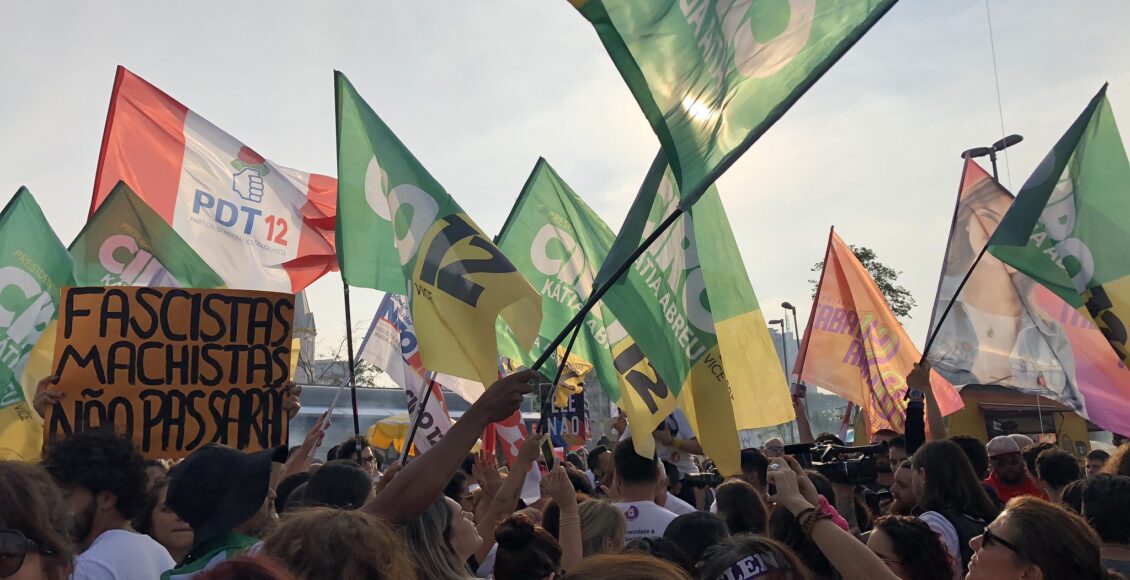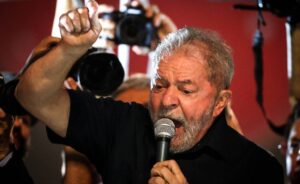The High Stakes of Brazil’s 2022 Presidential Election

Brazil’s 2022 election will be decisive for the country. Incumbent president Jair Bolsonaro could do what his frequent comparison, Donald Trump, could not: win re-election. If he does, Latin America’s largest democracy could face an authoritarian threat.
Starting in 2014, observers identified increased political polarization, where a tense vote led to the reelection of Dilma Rousseff of the left-wing Workers’ Party (PT) as President in a fragile coalition. Rousseff was the political protégé of ex-president Luiz Inácio Lula da Silva (known as Lula), who had served two terms as president from 2002 to 2011. In 2014, the corruption inquiry ‘Operation Lava Jato’, concerning Brazil’s national oil company, began prosecuting widespread graft and money laundering among Brazil’s political elites. As Brazil’s economy worsened, Rousseff’s unpopularity led to an impeachment by Congress on weak grounds of campaign financing (unrelated to Lava Jato), and the ascension of vice-president Michel Temer. Sergio Moro, the investigative judge in charge of Lava Jato, then questionably set his sights on Lula. With the country divided and faith in politics faltering, political ‘outsider’ Jair Bolsonaro pulled off an unlikely win in 2018 with extreme, far-right, populist messages and took power. In recent weeks, Supreme Court decisions have allowed Lula to once again run for President, setting up a collision course of the right and left in Brazil.
I interviewed Professor Manuel Balán, the Acting Director of the Institute for the Study of International Development and Associate Professor of Political Science and International Development at McGill University. Previously, Professor Balán worked on Transparency Policies at the National Anti-Corruption Office of Argentina.
Alexander Kelly
What is the state of Brazilian democracy today? How has it changed since Bolsonaro became president?
Professor Balán
Some people have talked about the erosion of democracy in Brazil, or [democratic] backsliding. One way of thinking about this is that there are shades of grey of democracy. Another way is you may see certain threats to that democracy. If we look at it in the first way, degrees of gray, we can see some democratic erosion in Brazil. We can see that minorities of different kinds, whether we’re talking about race, gender, or class, minorities have done worse off in Brazil, [their] rights have been threatened. Now, this doesn’t mean that Brazil has ceased to be a democracy, it means that it’s a lower quality democracy for minorities. On the other hand, in this way of democratic threats, we can see that during Bolsonaro, there are more threats present. And those threats have to do with a heightened role for the military. The military is not a democratic force in Brazil, and the military has gotten more powerful, in terms of [its] independence and budget, but also in terms of cabinet posts for military members. This is a potential threat. It hasn’t been realized, it’s not that the military has taken over power, but they have more power than they did before. The third issue has to do with the democratic process itself. And so whether Bolsonaro will play by the rules, run free and fair elections and step down, if voted out of power. Again, this is a threat, because it hasn’t happened yet. But it may happen. And so the short answer to how is the state of democracy right now in Brazil? Well, it has gotten worse under Bolsonaro. There’s nothing radical that has happened yet in terms of change of regime type. But we’re closer.

Alexander Kelly
How do former president Lula’s convictions being recently overturned impact Bolsonaro’s chances in the 2022 elections?
Professor Balán
So Lula will be permitted to run for the presidency next year… [This] hurts Bolsonaro. And it hurts him on one main thing, which is it coalesces the opposition to Bolsonaro around a figure that is still very popular, that is widely recognizable. That can coalesce the opposition to Bolsonaro in a way that nobody else in Brazil could do up to now. Well, now the leadership is there, Lula, is there. The other impact is independent from Lula. Until late last year, even with the pandemic, Bolsonaro’s approval numbers were really high. And this was explained by two main things. One was COVID-19 hadn’t hit Brazil in the way that people anticipated it would. And this helped the government. That has really changed, as we all know. The new Manaus variant and the case numbers that Brazil has seen over the last month and a half are really dismal, thousands of deaths a day. Everybody knows somebody who is dead, who had COVID-19 and was near death, who’s struggling. This hurts Bolsonaro, because he has undermined the importance of the virus, and that’s now hitting him in the face. The second thing that has really hurt his popularity is that during last year, the government spent a lot of money and gave a lot of people a lot of money for economic recovery. So people were seeing salaries that they never actually have, thanks to the economic assistance policies of the state. Those programs have now been scaled back significantly. So now you have people that are out of a job, not getting government help, and are getting sick with COVID. This is not a good scenario for Bolsonaro.

Alexander Kelly
Would you say that Bolsonaro’s COVID-19 response has been the most consequential impact of his presidency?
Professor Balán
When it comes to actual policies, Bolsonaro doesn’t have majorities in Congress to pass a lot of legislation. He has the executive power to do things, but he does not have the type of coalition that is needed to move legislation forward, he has no sort of congressional majority and no congressional strategy really to pass any legislation. What he has is the power of the executive. And the power of the executive is really, really, really important when it comes to a couple of things. Expenditures, because the executive decides how the government allocates money. Also the COVID response, which has been dismal in Brazil, terrible in many, many different ways, however you look at it. And third, things such as regulation of business, and environmental protection. He has lifted every single regulation on business that he could possibly lift…
…There’s no legislation really, that has been passed in this regard. If these had been legislative decisions, I would say this is a huge problem. It’s been more about executive power, [the] mismanagement of a number of different issues. Somebody else takes on the executive, they reverse those measures, the impact on the environment lasts, but it’s a few years, right. So in the grand scheme of things, this could be reversed. If you see a more environmentally conscious leader come next, things could change, not that Lula was that leader by the way.
Alexander Kelly
Moving forward to the 2022 election, what are the biggest policy decisions at stake for Brazil?
Professor Balán
I think the main threat if [Bolsonaro] wins is the public image threat. This guy has done whatever he wants to do, and has said whatever he wants to say, and he’s still getting a majority of the votes being the outlandish, politically incorrect figure that he is, and getting a majority of votes. And having done all that, maybe empowering him, to take a real run at Brazilian democracy, and start really undermining democratic institutions. Oh, so I don’t have Congress, I’m going to dissolve Congress, you know? That’s my sense, and my sense is that this is what we are facing. That’s the worst case scenario. In Brazil, if Bolsonaro is reelected, it’s a serious worst-case scenario.
Alexander Kelly
What is the risk surrounding Brazil’s 2022 election?
Professor Balán
I’m hopeful right now, the direction that we’re headed in is not a very powerful President, that is growing deeply unpopular by the day. I think if we are on the same path as we are right now, [there isn’t] enough there to really even threaten the electoral process. Now, with a more competitive Bolsonaro, we could see him radicalizing his discourse, in order to mobilize a base of supporters. With a more competitive election, this will be a deeply polarizing, damaging, and threatening type of election, where there’s going to be no pulled punches, they’re going to go at each other hard. I think that has negative effects on democracy in the long term. So let’s say, mutual toleration is a basic norm of democracy. If we see Lula and Bolsonaro going for the presidency next year in a competitive way, that they don’t tolerate one another, this is potentially really problematic. The second thing is this idea of institutional forbearance, the restraint of one’s powers in government to protect the system as a whole. I think [Bolsonaro] will use everything at his disposal in order to win that election.
The featured image of protestors, “29 Setembro 2018” by Mark Hillary is licensed under CC BY-NC 2.0.
